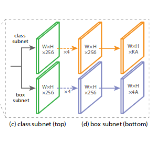Despite the recent success of long-tailed object detection, almost all long-tailed object detectors are developed based on the two-stage paradigm. In practice, one-stage detectors are more prevalent in the industry because they have a simple and fast pipeline that is easy to deploy. However, in the long-tailed scenario, this line of work has not been explored so far. In this paper, we investigate whether one-stage detectors can perform well in this case. We discover the primary obstacle that prevents one-stage detectors from achieving excellent performance is: categories suffer from different degrees of positive-negative imbalance problems under the long-tailed data distribution. The conventional focal loss balances the training process with the same modulating factor for all categories, thus failing to handle the long-tailed problem. To address this issue, we propose the Equalized Focal Loss (EFL) that rebalances the loss contribution of positive and negative samples of different categories independently according to their imbalance degrees. Specifically, EFL adopts a category-relevant modulating factor which can be adjusted dynamically by the training status of different categories. Extensive experiments conducted on the challenging LVIS v1 benchmark demonstrate the effectiveness of our proposed method. With an end-to-end training pipeline, EFL achieves 29.2% in terms of overall AP and obtains significant performance improvements on rare categories, surpassing all existing state-of-the-art methods. The code is available at https://github.com/ModelTC/EOD.
翻译:尽管长尾天体探测工作最近取得了成功,但几乎所有长尾天体探测器几乎都是在两阶段模式的基础上开发的。实际上,一阶段探测器在行业中比较普遍,因为它们有一个简单而快速的管道,容易部署。然而,在长尾情况下,这项工作迄今尚未探讨。在本文件中,我们调查一阶段探测器在这个案例中是否能够很好地发挥作用。我们发现,阻碍一阶段探测器取得出色性能的主要障碍是:在长期数据分发中,各类别存在不同程度的正反向不平衡问题。常规协调中心损失使培训过程与所有类别相同的调制因素相平衡,因此无法处理长期问题。为解决这一问题,我们建议采用平衡不同类别正负抽样造成的损失贡献的平级计算(EFEL),根据其不平衡程度独立调整。具体地说,EFLFL采用一个与类别相关的调控因素,可按不同类别的培训状况动态调整。在具有挑战性 LVIS/MER2 中进行的广泛实验,从而未能处理长期问题。我们提出的AFLA/rreal 的升级方法,在现有的标准中实现了显著的业绩改进。




